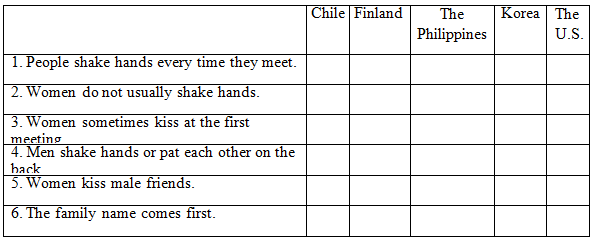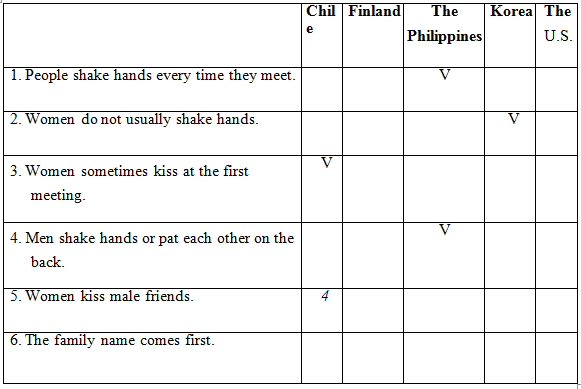A.Reading
Part 1. Read the passage and put a tick (V) in the right column.
Meeting and Greeting Customs
There are many different greeting customs around the world. Here are some.
Chile: People usually shake hands when they meet for the first time. When two women first meet, they sometimes give one kiss on the cheek. (They actually “kiss the air”). Women also greet both male and female friends with kisses. Chilean men give their friends warm hugs or sometimes kiss women on the cheek.
Finland: Finns greet each other with a firm handshake. Hugs and kisses are only for close friends and family.
The Philippines: The everyday greeting for friends is a handshake for both men and women. Men sometimes pat each other on the back.
Korea: Men bow slightly and shake hands to greet each other. Women do not usually shake hands. To address someone with his or her full name, the family name comes first, then the first name.
The United States (U.S.): People shake hands when they are first introduced. Friends and family members often hug or kiss on the cheek when they see each other. In these situations, men often kiss women but not other men.

Part 2. Read the passage and then complete the summary below it.
Conversational Turns
Probably the most widely recognised conversational convention is that people take turns speaking. But how do people know when it is their turn? Some rules must be present, otherwise conversations would be continually breaking down into a disorganised jumble of interruptions and simultaneous talk.
Turn-taking cues are usually quite subtle. People do not simply stop talking when they are ready to yield the floor. They usually signal in advance that they are about to conclude. The clues may be semantic (“So anyway,…” or “Last but not least,but more commonly the speech itself can be modified to show that a turn is about to end – typically, by lowering its pitch, loudness, or speed.
Body movements and patterns of eye contact are especially important. While speaking, we look at and away from our listener in about equal proportions; but as we approach the end of a turn, we look at the listener more steadily.
Listeners are not passive in all of this. Here too there are several ways of signaling that someone wants to speak next. One way is through an observable increase in body tension – by leaning forward or producing an audible intake of breath. A less subtle approach is simply to interrupt – a strategy that may be tolerated, if the purpose is to clarify what the speaker is saying, but that more usually leads to social disapproval.
SUMMARY
Turn-taking is a way of organising (1) ________________so that people do not (2) ________ each other or (3) _________ at the same time. Some ways of signaling when you are about to stop talking are using specific (4) ‘ changing (5) ________ , loudness or speed, and looking more (6) ___________ at the listener. Listeners may show they want to talk by (7) _____________ up, leaning forward or simply (8) ________ which people disapprove of unless it is done for clarification.
B.Language forcus
Exercise 1. Choose the words with italicised letter(s) pronounced / a/ and / a: /.
1.passage fast language headmaster father classmate
2.lovely complain worry wonderful holiday month
3.student subject study suffer during hundred
4.party marvellous market marriage partner narrow
5.August laundry laugh because audience aunt
Exercise 2. Choose the best option (A, B, C or D) to complete each sentence.
1.My cousin is keen on_______ the English Club.
A.join B.to join C. joining D. having joined
2.There is no point in______ the child now. What is done is already done.
A.punishing B.teaching C. helping D. paying
3.A favourite occupation among children is________
A.to build B.building C. build D. being built
4.We couldn’t stop that dog from _____ us wherever we went.
A.coming B.joining C. watching D. following
5.He insisted on_______ the job himself.
A.to do B.do C.doing D.having done
6.The little boy’s favourite game was__________to be an emperor
A.pretend B.pretemded C.to be pretending D.pretending
7.A popular sport in this place is_______wild bears.
A.to hunt B.hunting C.hunt D.hunted
8.The doctor advised him to give up_____
A.drinking B.drink C.to drink D.drunk
9.His latest hobby is_______seashells
A.making B.discovering C.finding D.collecting
10.When you wade in the stream, you must beware of_____on sharp stones
A.having stepped B. being stepped C. stepping D.to step
Exercise 3. Choose the appropriate options (A-H) to complete the sentences (1-8).
A .to enter E.to shelter
B.to admit F. to read
C.to serve G. to move
D.to announce H.to write
1.She learnt____________when she was quite young.
2.They are__________the results immediately after the last contestant has performed.
3.You are________out the composition in black ink on lined paper.
4.The crowd of people wanted_______ at the same time, so there was a jam in
the doorway.
5.The ladies are________ refreshments for the visitors after the exhibition.
6.They intend_________into a bigger house.
7.My brother refused_______ that he was wrong.
8.They went into the hut because they wanted________ from the rain.
Exercise 4. Put the verbs in brackets into gerund or infinitive.
She apologised for (borrow) my dictionary without (ask) for
permission and promised never (do)________ it again.
Most people prefer (spend)_________ money to (earn)_________
He made me (repeat)_________ his instructions (make)___________ sure that I
understood what I was (do)_________ after he had gone.
I didn’t feel like (work)____________________________ so I suggested (spend)_____ the day in
the garden.
Why do you keep (look)______ back? Are you afraid of (be)_______ followed?
He decided (put) broken glass on top of his wall (prevent) boys
from (climb) over it.
You still have a lot (learn)__________ if you forgive my (say) _________
It’s no use (try)__________ (interrupt) You’ll have
(wait)__________ till he stops (talk)________
He didn’t like (leave)____________ the children alone in the house but he had no
alternative as he had (go)__________ out to work.
We got tired of (wait) for the weather (clear) and
finally decided (set) ________ out in the rain.
Đáp án
A.Reading
Part 1:

Part 2:
1.conversations 2.interrupt 3. talk 4. phrases
5.pitch 6.steadily 7. tensing 8. interrupting
B.LANGUAGE FOCUS
Exercise 1.
1.fast, headmaster, father, classmate
2.lovely, worry, wonderful, month
3.subject, study, suffer, hundred
4.party, marvellous, market, partner
5.laugh, aunt
Exercise 2.
1.C 3.B 5.C 7.B 9.D
2.A 4.D 6.D 8.A 10.C
Exercise 3.
1.F 3.H 5.C 7.B
2.D 4.A 6.G 8.E
Exercise 4.
1.borrowing – asking – to do
2.spending – carning
3.repeat – to make – to do
4.working – spending
5.looking – being
6.to put – to prevent – climbing
7.to learn – saying
8.trying – to interrupt – to wait – talking
9.leaving – to go
10.waiting – to clear – to set




Comments mới nhất